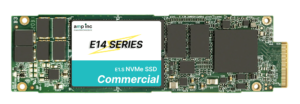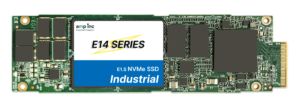Find and purchase these parts online. Click the part numbers below.
E14 Series PCIe Gen4 x4 3D TLC


AMP, Inc.’s E14 Series SSD provides you the ultimate performance and ultra-high reliability over traditional hard disk drives by achieving up to 3,500MB/s for sequential read, 3,000MB/s for sequential write, 500,000 IOPS for random read, and 55,000 IOPS for steady state random write.
The E14 Series SSD uses a single-chip Flash controller to manage multiple NAND Flash memory modules. The controller works with a host system to allow data to be written to and read from the Flash memory modules through a PCIe interface.
The E14 Series integrates high speed PCIe Gen4x4 interface with third generation 3D TLC NAND flash memory technology, delivering capacities up to 8TB.
Key product highlights include:
- High I/O and throughput performance
- Next generation LDPC technology secures NAND endurance
- Advanced flash management and global wear leveling algorithm extending drive life
- High stability and reliability
- Temperature monitoring and intelligent management
| AMP Inc Part Number | Capacity |
|---|---|
| AMPOLE1P440960-MQ060AI(C)* | 1TB |
| AMPOLE1P4401T9-MQ060AI(C)* | 2TB |
| AMPOLE1P4403T8-MQ060AI(C)* | 4TB |
| AMPOLE1P4407T6-MQ060AI(C)* | 8TB |
* C = Commercial Temperature
* I = Industrial Temperature
E1.S PCIe Gen4 x4 TLC
AMP Inc.’s E1.S series SSD provides you the ultimate performance and ultra-high reliability over traditional hard disk drive. The E1.S series SSD consists solely of semiconductor devices, it does not contain any mechanical part such as platter (disk), motor and suspension as traditional hard disk drive. Thus, it exhibits superior performance, capacity, reliability, ruggedness, low power, and small form factor profiles that qualified to be the best storage solution for enterprise application with extreme workloads and increased MTBF requirements.
AMP Inc.’s E1.S SSD uses a single-chip Flash controller to manage multiple NAND Flash memory modules. The controller works with a host system to allow data to be written to and read from the Flash memory modules through a PCIe interface.
| AMP Inc Part Number | Capacity |
|---|---|
| AMPOLE1P440960-T406OLI | 1TB |
| AMPOLE1P4401T9-T406OLI | 2TB |
| AMPOLE1P4403T8-T406OLI | 4TB |
| AMPOLE1P4407T6-T406OLI | 8TB |


